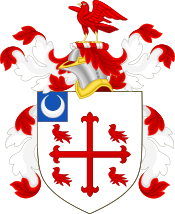William Byrd III
William Byrd III | |
|---|---|
 Portrait by John Hesselius | |
| Born | William Byrd III September 6, 1728 |
| Died | January 1 or January 2, 1777 (aged 48) Charles City, Colony of Virginia, British America |
| Resting place | Old Westover Church cemetery |
| Education | Middle Temple |
| Occupation(s) | Plantation-Enslaver, Soldier, Member of the Virginia House of Burgesses |
| Spouse(s) |
Eliza Carter
(m. 1748; died 1760)Mary Willing |
| Children | 15, including Charles Willing Byrd |
| Parent(s) | William Byrd II Maria Taylor Byrd |
| Relatives | William Byrd I (grandfather) |
| Military career | |
| Allegiance | |
| Service/ | Second Virginia Regiment |
| Rank | Colonel |
| Battles/wars | French and Indian War |
Colonel William Byrd III (September 6, 1728 – January 1 or January 2, 1777) was an American planter, politician and military officer who was a member of the House of Burgesses.[1]
Career
[edit]He was son of William Byrd II and Maria Taylor Byrd, and the grandson of William Byrd I. Byrd inherited his family's estate of approximately 179,000 acres of land in Virginia and continued their tradition of serving as a member of the Virginia House of Burgesses. He chose to fight in the French and Indian War rather than spend much time in Richmond. In 1756 he was colonel of the Second Virginia Regiment.
William Byrd III had a reputation as a notorious gambler.[2] He initiated what was said to have been the first major horse race in the New World, involving fellow Virginia planters John Tayloe II, Francis Thornton, and Samuel Ogle & Benjamin Tasker Jr. of Maryland.
After he squandered the Byrd fortune on building a magnificent mansion at Westover Plantation, gambling, and bad investments, Byrd parceled up much of the land he had inherited from his father and sold it off to raise money to pay his debts. He also sold the enslaved African laborers who had worked on his estate plantation.
Although his sale of property in assets of land, and enslaved, generated a huge sum, it still was not enough to pay off his creditors. Later, Byrd resorted to a lottery, the prizes of which would come from his estate, Belvidere, at the falls of the James River. However the lottery failed to generate sufficient revenue.[3]
Marriage and family
[edit]
In 1748, Byrd married Elizabeth Carter, daughter of Robert Carter I, who had recently died. An excellent political match, as her father had been the colony's richest man. Gaining his wealth as a prominent plantation owner, and enslaver. He served in the House of Burgesses and then the colony's Governor's Council (eventually becoming its president by seniority). Together they had five children, 4 sons and 1 daughter. Byrd had repudiated Carter before her death in 1760, which is considered a probable suicide. [4] Byrd remarried, and fathered ten more by his second wife, Mary Willing, daughter of Charles Willing of Philadelphia. Despondent and nearly broke, Byrd killed himself on January 1 or 2, 1777. He was buried in the cemetery at the old Westover Church.
The 10 children of his second marriage (to Mary Willing) were:
- Maria Horsmanden Byrd
- Evelyn Taylor Byrd
- Charles Willing Byrd (died as child)
- Abby Byrd
- Anne Willing Byrd
- William Boyd Byrd
- Charles Willing Byrd
- Dorothy Byrd (died as child)
- Jane Byrd
- Richard Willing Byrd
References
[edit]- ^ Evans, Emory G. "William Byrd (1728–1777)". Encyclopedia Virginia. Retrieved 15 July 2015.
- ^ "A gambler's tale: The son of Richmond's founder had quite a life - and death". Richmond Times-Dispatch. 13 February 2021. Retrieved 2021-06-10.
- ^ Dabney, Virginius (1990). Richmond: The Story of a City: Revised and Expanded Edition. Charlottesville, Virginia: University Press of Virginia. p. 19. ISBN 0813912741. OCLC 20263021. At Google Books.
- ^ "A gambler's tale: The son of Richmond's founder had quite a life - and death". Richmond Times-Dispatch. 13 February 2021. Retrieved 2021-06-10.
External links
[edit]- William Byrd III at History.org
- William Byrd III at Find a Grave
- 1728 births
- 1777 deaths
- 18th-century American politicians
- 18th-century suicides
- Planters from the Thirteen Colonies
- American politicians who died by suicide
- American racehorse owners and breeders
- Slave owners from the Thirteen Colonies
- British America army officers
- Byrd family of Virginia
- House of Burgesses members
- People from colonial Maryland
- People of Virginia in the French and Indian War
- Suicides in Virginia
